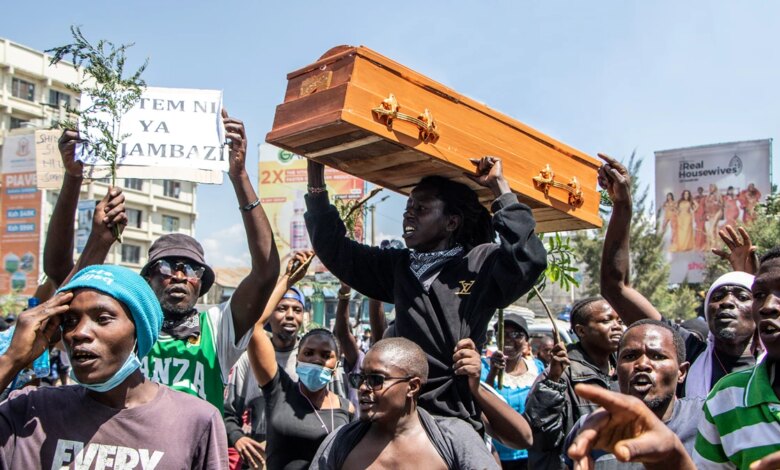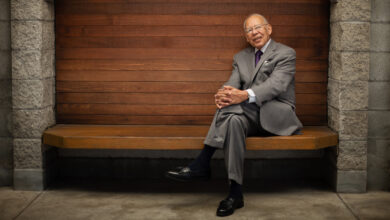After Protests Turn Violent, Kenyan Churches Stand with Ge…… | News & Reporting

Among the many people William Ruto thanked after winning Kenya’s 2022 presidential election were religious leaders, significant numbers of whom had enthusiastically campaigned for the career politician.
“I am sure their prayers will not be in vain,” Ruto said, considered by many to be the East African country’s first evangelical president.
Kenyan church leaders have more to pray about after the East African nation’s government violently cracked down on hundreds of young people protesting a finance bill last month, injuring more than 200 and killing at least 24.
Last Wednesday, Ruto withdrew the bill that would have raised taxes on milk, bread, diapers, and pesticides, as part of measures he had defended as necessary to address the country’s debts. But in a country of 58 million where more than 80 percent of residents are under age 35, the issue sent thousands of young people to the streets in 25 of Kenya’s 47 counties.
Their defiance in the face of tear gas, intimidation, and brutality did not go unnoticed by pastors and bishops.
“We do want to appreciate and applaud Gen Zers for their engagement with issues of national interest,” said Calisto Odede, the presiding bishop of CITAM (Christ Is the Answer Ministries), in a statement last week.
“On the one hand, they mobilized protests against unfair tax regimes in a legal manner that was apolitical and devoid of ethnic innuendoes,” said the Pentecostal denominational leader, “and on the other hand, they pricked the conscience of the church to purge the pulpits of our churches from undue influence by politics and politicians.”
Judging by the lack of church-related social media posts, few congregations wanted to associate themselves with politicians this Sunday. One church canceled a fundraiser that First Lady Rachel Ruto was headlining, as did another church that had advertised that 14 politicians would be attending an event marking its new sanctuary.
The Evangelical Alliance of Kenya, which represents about 900 denominations, also called on churches to protect the “sanctity of the pulpit” and to avoid hosting politicians.
The recent protests aren’t the only time when church leaders have tried to separate themselves from politicians. In 2021, one year before the presidential election, Anglican, Presbyterian, Roman Catholic, and evangelical leaders announced they would ban candidates from their pulpits.
But the measure had little effect on local congregations.
“They just made a public statement without any practical implementation,” said Benjamin Kibara, a canon at St. Stephen Anglican Church in Ruiru. “Statements from top denomination leaders have no mechanism of implementation in every local church across the country.”
Now, protestors hope they can make change.
“Deplatform politicians in churches,” stated one pamphlet from the protest movement that has circulated widely on social media. “Don’t allow any politician or Ruto to speak in your church.”
“How Gen-Zs drove the Church back to God” readThe Nation, which bills itself as Kenya’s most widely read newspaper.
“One of the blessings of this Gen Z: They have reminded us as a church that the church is a place of worship but not a political platform,” Kibara preached on Sunday. “We had forgotten that, and almost every Sunday, politicians had the habit of coming to our congregation to drive their own political agenda.”
Gen Z’s invitation to the church to live out its convictions “are needed for the transformation of African societies,” said Kevin Muriithi Ndereba, who leads the department of practical theology at St. Paul’s University in Nairobi.
“They are also bringing issues of justice to the core of Christian belief and practice, so that following Christ is not reduced to a matter of going to heaven but living justly on earth.”
Though several Kenyan Christian leaders pushed for significant political reform, these changes were received poorly by both the church and state, said Muriithi Ndereba. Since the 2000s, he noted, the church has often taken the side of the government and been slow to critique politicians, as these relationships have often personally benefited pastors financially. These trends have only intensified under Ruto, “because he used Christianese to mobilize political votes and craft his agenda.”
The protests come after years of Gen Z observing these dynamics alongside other social movements like the Arab Spring, South Africa’s #FeesMustFall campaign, #MeToo, and frustration around racial injustice and abuse in the American church.
“This current Kenyan protest movement has been a tipping movement or watershed moment that has brought back some of these sentiments to the surface of young people’s lives and the intersections of faith and justice,” said Muriithi Ndereba.
Thousands of these young people showed up last Tuesday to All Saints’ Cathedral (ASC), the cathedral of the Anglican Church of Kenya, fleeing “furious” authorities.
“We are sad that despite seeking refuge in the house of God, police officers lobbed several tear gas canisters within the compound affecting several people,” wrote provost canon Evans Omollo in a statement.
Later, according to Omollo, military officers “stormed” the cathedral, threatening “unarmed, peaceful youth,” and shot live bullets, forcing leaders to evacuate protestors. The statement demanded an apology from the head of the police force “for his officers nearly desecrating our place of worship.”
The roughly 1,000-word Anglican statement also offered Ruto advice on actions to address austerity, corruption, and taxation, noting that, though the Anglican church believes in paying taxes, “we oppose overtaxation of the people which unfortunately largely is spent to finance [the] extravagant lifestyle of government officers displayed opulently in the public space.”
ASC’s offer of refuge to protestors came days after some protestors fleeing authorities claimed that Jamia Mosque had opened its doors to them while the Holy Family Basilica had refused. One widely forwarded WhatsApp message listed two Nairobi churches and a Christian student leadership center as being open to protestors.
Meanwhile, on Sunday, many pastors prayed for comfort for grieving families of those killed in the protests, the healing of physical and emotional wounds, and justice for the blood of innocent young people.
At Nairobi Chapel South, pastor Olunga Otieno outlined the “basis for justice,” grounding his arguments in Genesis 1:26.
“Any affront on the indelible rights of another human being is an affront on God himself,” he said. “People matter to God, and when their leaders treat them unjustly, it is the judgment of God such leaders will face.”
Several hundred miles away at CITAM Mombasa, senior pastor Joseph Ndung’u pondered the practical applications of holding a conviction that the “Lord reigns.” He noted:
We need to engage. At different times, God uses different people. Previously, for example, he used the freedom fighter—currently, he is using the Gen Zs. He can use anyone. He doesn’t have to ordain someone as a minister first before he can use him to accomplish his purposes. The question is, how much have we invested in our Gen Zs so that as they go out they do it the right way and represent us well?
At Lavington Vineyard Church in Nairobi, Joshua Oyugi released a three-page statement to his congregation, using the political situation as a way to explain the salvation message.
“The public discontent with the finance bill is just the face of many other issues that consistently aggrieved the Kenyan people,” he wrote. “The bill, coupled with corruption, misappropriation of funds, and greed, reflects a bigger problem: sin.”
Though he agreed with Gen Z activists’ call for political change and accountability, John Kimani William of Kingdom Seekers Fellowship in Nakuru said that the protestors had unfairly accused the church of being too aligned with politics.
“God sent prophet Samuel to anoint Saul as king over Israel, and yet Saul failed both God and man,” he said. “Our role as a church is to pray for our country and the president to stay on track. The destinies of the church and the state are intertwined. If the government fails, so does the church. If we don’t pray for our leaders and nation, we sin against God.”
At Nairobi Chapel Greenpark, church members broke into groups of six to pray for personal repentance, repentance for the nation, those adversely affected during the protests, the next generation, the president and government, and the future of the nation. The church also played the national anthem, “Ee Mungu Nguvu Yetu,” or “O God of All Creation.”
Senior pastor Andrew Kariuki also acknowledged that the bill and protests had provoked tension within the church.
“I want to apologize for those in church leadership positions who have said things that are not in alignment with many Kenyans,” he said. “The church is not a public entity. Our church recognizes the failure of church leadership. We must lead as Jesus led.”
Reminding his congregation that the church believed “in the rule of law, the voice of the people, the sanctity of life, and freedom of expression,” pastor Donald Gichane at Ruach West Assembly in Nairobi came out adamantly against the bill.
“We stand with the people of Kenya and, more importantly, with the voice of God in calling what’s wrong, wrong, and what’s right, right!”
Young people are waiting to hear what the church has to say, Linda Ocholla, an Anglican priest, told Nairobi Chapel, one of the largest evangelical megachurches in Kenya.
“They want to know what the Word of God is saying for young people, whose economic prospects have been snuffed out or are being snuffed out as they watch resources being mismanaged,” she said, as part of a special teaching series she is currently leading. “What is God’s Word for us as a society?”
At a Presbyterian Church of East Africa (PCEA) congregation in Nakuru West, theology student Monicah Mbiyu addressed her fellow young people.
“It’s important to express your concerns, but we need to address them not on the road but on our knees, peacefully and prayerfully, trusting in God’s wisdom to address the issues affecting us.”
At PCEA St. Andrew’s, associate minister Phyllis Byrd Ochilo altered the congregation’s normal prayer schedule to ask Gen Z to stand and receive prayer. She also called for a moment of silence for protestors Evans Kiratu and Rex Kanyike Masai, who died because “they stood for justice and it cost them their lives.”
The protestors set an example by backing up their words with action, said parish minister Julius Mwamba, noting that some helped injured police officers by giving them water to wash their faces when the officers were overcome by tear gas, and others wheeled a member of parliament with a disability out of the building after the man’s colleagues had fled. (Part of the parliament was later set on fire by protestors.)
“We are all Kenyans and must embrace each other and extend love to one another,” Mwamba said.
People may have assumed that Gen Z wasn’t paying attention to national circumstances or just aimlessly absorbed in their phones, but they “understand the issues burning down the country very clearly,” said pastor Chrispine Omondi of Thika Road Baptist Church.
“The level of corruption in this country cannot continue as business as usual,” he preached on Sunday. “While I plead for a peaceful resolution, I would like to see the government heed the cries of all the Kenyan people as expressed by these young people in the streets.”
People of all ages attend Missionary Church Kenya, where bishop Charles Matheka Kinyanjui reminded older members of his congregation that, while they might blame young people for their problems, many young people had gone to school but later could not find a job.
“We have failed to teach them the ways of the Lord but we condemn them when they do things the wrong way,” he said. “We have not given them responsibilities in the church, it’s only the elderly that have roles. The young people know nothing of being in Christ.”
The Kenya National Congress of Pentecostal Churches called on the government to protect struggling people.
“When you hear young people speak, it is because we have problems, acute problems,” said Frastus Njoroge, a bishop who spoke for the umbrella group. “They don’t have jobs and don’t know where to get money. What you are hearing is that they are desperate.”
Precious Call Khamasi, a youth pastor at CITAM Valley Road, personally attended the protests.
“I have felt the pinch of the harsh economic environment as a result of the increased taxes, and secondly, I pastor the youth in our church and I felt the need to stand with them not only in prayer but also with my presence on the streets,” he shared in a statement.
Khamasi drew parallels between his and his fellow young people’s experiences of the last month and the biblical experience of Joseph, grappling with the harsh reality that the place where he should have found security and growth was instead a place that was choking the “life out of him.”
“The money that should go a long way in creating opportunities, funding internship programs, hiring teachers, doctors, and other professionals, et cetera, is the money that is being embezzled and wasted through corruption and misplaced priorities in the budgeting,” he wrote. “The same police officers that are supposed to keep them safe are the very ones using excessive force, brute strategies to contain the masses and shooting at unarmed protestors.”
The church should be a “sanctuary of peace and truth, free from the divisive and often corrupting influence of political agendas,” preached pastor Jacob Kipchillis of the Full Gospel Churches of Kenya.
“We must strive to create an environment where social justice and righteousness prevail, reflecting the values of the kingdom of God,” he said. “Let us listen to the voices of our young people and lead with integrity, ensuring that our actions are in alignment with the teachings of our Lord and Savior, Jesus Christ.”
Additional reporting by Betty Muriuki, Victor Bajah, David Ngaruiya, Emmanuel Wanyonyi, and Marion Ndeta.




